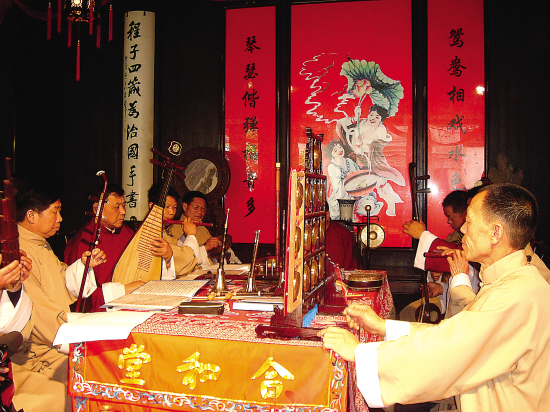Municipal ICH-Tang Ming
During the reign of Emperor Jialong of the Ming Dynasty, Wei Liangfu and a group of musicians of traditional opera initiated the reform of Kunqu Opera at the south wharf of Taicang. They created a new way of singing Kunqu Opera which was called the “Shuimo Tune”. They also reformed musical instruments and set up a band of stringed and woodwind instruments to play for this new singing type. Zhou Chun, a native of Shuangfeng, learnt the Shuimo Tune and began to sing Kunqu Opera in this new way of singing. It is him that introduced the Shuimo Tune to professional opera troupes. He introduced the drummer role, or a Tang Ming according to ancient Chinese, and set up his own troupe of Kunqu Opera, known as the Yu Qing Tang (see page 316 of China Kunqu Opera Dictionary).
The troupe was welcomed by audiences because they both sang and played instruments. Other such troupes, such as Jiyu Tang and Sanxing Tang, emerged following Zhou’s example. Zhou was given the respectful title as, “founder of the Tang Ming (opera troupes) in its real sense” by peers.
Since then, Tang Ming began to refer to troupes that played Kunqu Opera and the kind of performances they gave. A vivid statue of Zhou was erected in the local Town God’s temple. According to Annals of Taicang Prefecture, which was recorded by Zhang Cai in the Emperor Chongzhen period in Ming Dynasty, “Taicang people are good at singing and dancing. Wei Liangfu, a local resident, established a new tune of Kunqu Opera.” According to research led by the academic magazine, Traditional Chinese Operas, Kunqu Opera troupes, or Tang Ming, were very popular in the olden days. Tang Ming has played an important role in popularizing the Kunqu Opera and later, helped maintain the folk opera from generation to generation.

The members younger than 16 years old in an opera troupe are called “little Tang Ming”, and those older than 16 years old are “big Tang Ming”. A Tang Ming opera troupe normally consists of eight members. It may also comprise four members to form a “semi-Tang Ming,” or six, 10, or 12 members to form a “one and half Tang Ming”. The troupe would have no more than 14 members.
The troupe normally performs around two square tables placed end to end. The tables are covered with a cloth showing the name of the band, such as Yu Qing Tang. The Chinese gong chimes and the instrument stands with bamboo flutes are placed on the tables. The actors sit by the tables with the lead singers in the middle and their seats are adjusted as the plot progresses.
In Taicang, the Tang Ming performances proceed in rounds. A round starts with the banging of gongs and drums and then moves to singing four selected scenes from famous operas. When Tang Ming performers play for special occasions such as weddings, funerals and ceremonies, they perform four or five rounds. The audience may select the scenes they’d like to be played.
Representative tunes for the gong and drum performance include “The General’s Command”, “West Wind”, “Duke of Shou Ting”, “Taicang Da Hong Pao”, and “Wan Hua Deng”.
The four scenes from operas are staged after the gong and drum performance. The performers normally sing a scene with all kinds of characters first, such as “Happy Birthday”, “Blessing” and “Gathering of the Immortals”. The characters are the male, the female, the painted face and the clown. Then they sing single character scenes, for example an old gentleman’s scene, an officer’s scene, a female character’s scene or others. The performers will sing and narrate to the musical accompaniment. At this time, they are not wearing make up. When it comes to rival shows, two troupes will take turns to perform. If the first musical band presents a scene from the “Peony Pavilion”, the second band will not perform any part from the same opera. To impress audiences, some musical bands add one or two Tanhuang (a kind of folk opera) performances to a round.









